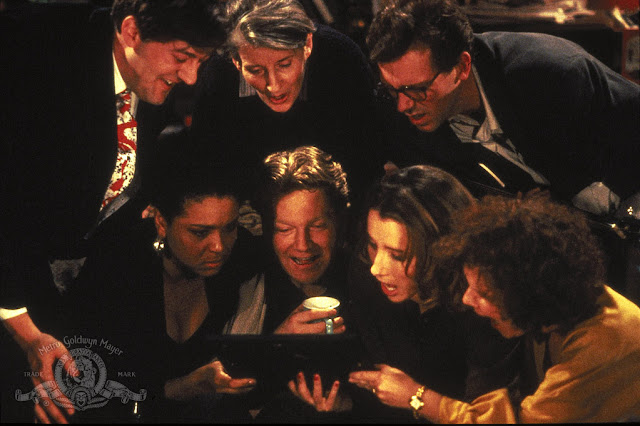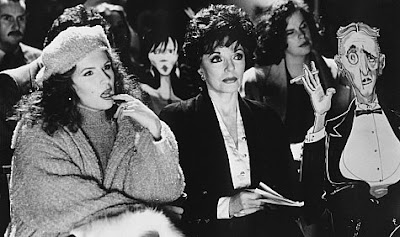On Hobbits and Christmas with Ken
Thanksgiving week, 2003. I was enrolled at UF, living in my very exclusive *single* room on the fourth floor of the Graham dormitory, fretting over the upcoming finals and papers due the next month. Mercifully, my parents, along with my sister, picked me up from Gainesville on the way to Palmyra, Virginia, where we would all spend the holiday with my grandparents. They had retired from Long Island to a relatively rural community in the woods. While it was undeniably peaceful and idyllic, and we all enjoyed walks by Lake Monticello all bundled up against the crisp air, my sister and I lamented the lack of any kind of technology whatsoever.
Luckily, I schlepped my Macbook and the extended editions of The Fellowship of The Ring (2001) and The Two Towers (2002) DVDs. My sister was indifferent to the films beforehand, but not being of drinking age and having no alternative entertainment during long hours sheltering from the cold, we proceeded to watch LOTR as we lay wrapped up in bed, eyes glued to my laptop’s screen.
A few weeks later, I met with half a dozen of my dearest friends back home for a midnight screening of The Return of the King (2003). Some of us brought the action figures of our favorite characters—mine was Samwise--to sit on top of our giant sodas while we sipped. We proceeded to bawl all over each other in the theatre at the end of all things. It represented a moment of deep appreciation for the power of cinema and more notably, friendship, especially since only a few years later, one of our nerd company suddenly passed away very unexpectedly. Every time I see Frodo reunited with what remains of the original fellowship, I imagine George sitting next to me, smiling as much as I am.
Christmastide, ever since, has become the traditional period not only for endlessly screening LOTR and indulging in other holiday classics, but also revisiting a handful of beloved epics.
I have a shortlist of favorites that have evolved over the years. Most haven’t budged. Doctor Zhivago (1965) must be viewed with my parents, ideally with spiked eggnog or any other festive cocktail to keep warm while watching what my dad calls “the coldest movie of all time.” Lawrence of Arabia (1972) is one I gleefully watch by myself, if only to balance out the cold. The Hobbit trilogy (2012-14) has been a welcome staple, which I have come to adore more every year. And there’s nothing more seasonal than the five-hour-plus television version of Ingmar Bergman’s engrossing family drama Fanny och Alexander (1982), which has a fair amount of Hamlet DNA and a great amount of Jul-tide production design.
Of course, there are classic (normal-length) films as well. Meet Me in St. Louis (1944) is the pillar of Christmas Eve because Judy Garland sings my favorite Christmas song—“Have Yourself a Merry Little Christmas”—with the *correct* lyrics and makes me cry without fail. White Christmas (1954) will be screened no less than five times (probably). TCM woke me up to the perfection of Christmas in Connecticut (1945) and It Happened on 5th Avenue (1947). National Lampoon’s Christmas Vacation (1989) and Trapped in Paradise (1994) are obligatory at my parents’ house. I always stop to watch A Christmas Carol (1938) and It’s a Wonderful Life (1946). These aren’t all of them, mind, but I wish to elevate a few sentimental faves right now.
No less than FOUR Kenneth Branagh films make my list, folks. Hamlet (1996) is quintessential for every reason, and it is, indeed set in the wintertime (a bit before or after “that season comes / Wherein our Savior’s birth is celebrated”), so it’s perfect. Murder on the Orient Express (2017) is full of luxury and snow, and what is Christmas without icy cold environs and people dressed to the nines?
The other two films, however, I’ve quietly enjoyed to myself for many years now, and they rarely get included or mentioned in any Christmas movie list. They are both early Kenneth Branagh projects, and they are both the most Kenneth Branagh movies ever.
Peter’s Friends (1992) is a time capsule of early 90s British holiday coziness, filled to the brim with the vitality of some of the best actors of their generation. Stephen Fry, Emma Thompson, Hugh Laurie, Imelda Staunton, and Ken himself play a bunch of theatre nerd friends (gasp!) who reunite for New Years several years after drama school together, all descending upon a big stately home of their most landed friend Peter (Fry). They’re all in different stages in their adult development, which leads to several opportunities for pathos and hilarity. I picked up on this one a while back, but didn’t fold it into my repertoire until more recently, when I needed a gentle means of re-entering my anglophile roots after a mental break from Britishness for obvious personal reasons. It provided a catharsis for my complex feelings and has since given me all the warm fuzzies every time I see it.
There’s one scene that hits me square in the chest: all the friends gather around the piano, where Hugh Laurie is (actually) playing “The Way You Look Tonight,” and one by one, the friends gather around and sing harmoniously together. When I was a teenager discovering Fred & Ginger movies, “The Way You Look Tonight” lodged in my squishy little heart, along with the mental image of Ginger washing her hair as Fred sang so wistfully in the next room. My mom and I are also prone to singing together as she plays piano, especially favorite Christmas tunes and hymns this time of year. It is one of those rare movie moments that feel especially designed to check all my boxes.
There is as much earnest charm as there is cynicism in Peter’s Friends, lending it a characteristic acerbic Britishness that oftentimes since has been overwrought in popular romcoms of its ilk—the types that gleefully spill a cup of schmaltz in the end to smooth over all the prickly drama. But under Ken’s direction, this specimen eventually finds a warm fireside armchair in which to curl up with a (spiked) cup of tea for the soul.
It’s A Midwinter’s Tale (1995), aka In the Bleak Midwinter, that I would put on a gold record and blast into space to represent Sir Ken’s filmmaking soul. It was released the year before his Hamlet, so it feels like an ardent studio pitch for his being allowed to make his ultimate Shakespearean epic. It’s a kind of sister film to the semi-autobiograhical Belfast (2021). They are the only two features that he made with his original screenplays (the rest are adapted from Shakespeare, and one from Mozart), they’re both in black and white, and neither have him onscreen as an actor. Both reveal more about Ken’s sensibilities and passions than anything else I’ve seen him make.
It’s clear that Michael Maloney’s character, Joe, appears as a flawless stand-in for Ken—he’s the oft-time overenthusiastic and always charismatic theatre actor/director who dares to mount an avant-garde and ultra low-budget production of Hamlet in a deconsecrated church in his home town at Christmastime. Dame Joan Collins plays his agent, who dutifully rolls along with his lamebrained idea as he auditions a motley crew (including Richard Briers and Nicholas Farrell, both of whom will star in Branagh’s eternity version of Hamlet). Much of the writing was done with the specific actors in mind, showcasing their inimitable talents for dry wit and popgun dialogue. The Hamlet this once-in-a-lifetime company eventually puts on is blood-sweat-tears-and-shit masterpiece that challenges their sanity and nourishes their souls.
Ken is all over this film. Joe dejectedly compares himself to Laurence Olivier, and another says that Brief Encounter (1945)—one of Ken’s all time favorite films—makes life worth living. Ken was always good at casting an ensemble, and each actor shines out without overshadowing the rest. Ken’s trusty composer Patrick Doyle even gets shoehorned in, delivering a blink-and-you-miss-it cameo as the “Scotsman.”
I must digress a bit to give big props to Maloney, who is an absolute dream of an actor, and always a treat to see. He’s one of Ken’s cinematic repertoire companions who played the Dauphin in Henry V (1989), Laertes in Hamlet, and Roderigo alongside Ken’s Iago in Oliver Parker’s Othello (1995). When he made a cameo appearance in Belfast I squeed. Thusly, Maloney is the final tie that binds--a theatre friend forever.
Christmas stories are about ghosts and families. Peter’s Friends and A Midwinter’s Tale are populated with chosen families found within the bounds of a theatre stage, and they’re subject to capricious spirits, past, present, and future. Ken’s words give full-throated testimony to shared, earnest passion for performance and its powers to enrich the hearts of players and audiences alike, money and fame be damned.
Much of the fun of being a Branagh scholar is savoring the sense of familial fondness imbued throughout his ouevre. I’ve always had a great respect for his affection for chosen kinfolk, which, alongside deep love of Shakespeare, is a value we share. How fitting, then, that after one year of (at least) three I shall spend in my self-styled scholarly pursuit, I find that Sir Ken will be there each winter season, to inspire me anew.

















Comments
Post a Comment